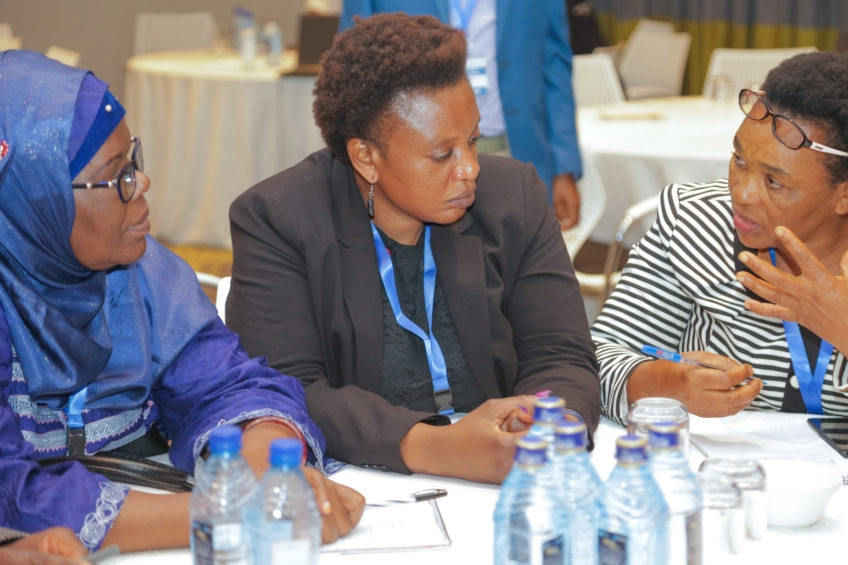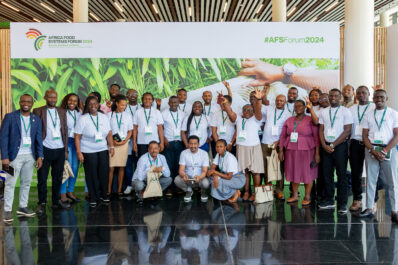Understanding Collaborative & Facilitative Leadership
25th April 2021 by Steve Smith, former Chief of Party for Africa Lead and current Chief of Party for Policy LINK

In February 2019, Africa Lead (the predecesor to Policy LINK) and the African Management Institute (AMI) launched the Executive Leadership Course for Africa’s food security with a pilot programme for participants in East and Southern Africa. An intensive six-month program, the course combined high impact in-person workshops with online learning and on-the-job feedback. This pilot programme was a formative experience in establishing components of the CALA Advanced Leadership Programme. At the heart of the learning experience in both programmes is the focus on collaborative and facilitative leadership.
The following is an introduction to facilitative leadership, why it is important for leaders delivering and implementing national agriculture priorities, and why it is deeply embedded in the CALA’s programmes.
In today’s world, data is the weapon of choice. Businesses, governments and even NGOs are investing more in data collection and analysis, with the intention to use this information to inform strategies and decisions, and in many cases to defeat the competition. Certainly, data can be powerful, but its effect on strategies and decisions isn’t straightforward. For example, timely data collected by the private sector often does not even lead to decisions.
There is something just as important as data for decision making, especially in making decisions that affect multiple stakeholders. It’s not something new. It is something that has driven decision making for tens of thousands of years, and now it is making a comeback as a focus of attention and study by organizational development specialists, psychologists, executive coaches, and businesses everywhere.
This “something” is human nature. No matter how good the data, there are always humans – with their emotions and insecurities – behind the decisions.
The facilitative leader focuses on relationships by first giving members of the group opportunities to share their needs and aspirations. This begins to make people feel safe, the first step in building trust. Listening, as opposed to telling, leads to connections among group members. The brains of group members receive signals of trust, which makes them open to influence. The result is the ability to co-create and build shared success.
One reason organizations under-appreciate and under-emphasize emotional skills is because they don’t lend themselves to measurement. Cognitive skills and the outputs from using them can be quantified, as in the design of a durable, cost-saving water system. The emotional intelligence skills of a deft facilitative leader, on the other hand, elude our measurement. There are no counterfactual evaluation models to assess the facilitative leader.
There are, however, a growing number of studies that clearly quantify the superior performance of organizations led by emotionally intelligent leaders. This information should be enough to rethink how we select key managers and how much we invest in their emotional leadership skills development. It has been enough for the private sector. According to a recent study conducted by the Center for Creative Leadership, companies that rated “highly for their investments in human capital deliver stock market returns 5 times higher than those of companies with less emphasis on human capital.” Further, in his book Working with Emotional Intelligence, psychologist and award-winning author Daniel Goleman wrote: “in a study of skills that distinguish star performers in every field from entry-level jobs to executive positions, the single most important factor was not IQ, advanced degrees, or technical experience, it was EQ (emotional quotient). Of the competencies required for excellence in performance in the job studies, 67 percent were emotional competencies.”
Let’s finish with a few thoughts on facilitative leadership of multi-stakeholder processes. Just as with any single organization, these leaders aren’t effective because of their title or because they are appointed or because they rotate into the role. More often than not, facilitative leaders emerge organically from within the community of stakeholders. This is one of the best things about facilitative leadership: nearly anyone can do it because it is not confined to the person with the title.
Facilitative leaders are fundamental to building sustainable structures and processes. Unlike technical skills, which need to be recruited and updated for each and every specialized topic, facilitative leadership is a skill that can be applied broadly across topics. Once institutions prioritize facilitative leadership and develop facilitative leaders, the investment will be sustained well into the future.
That said, facilitative leaders don’t just sprout out of any organization. Facilitative leaders come from organizations with emotionally intelligent cultures characterized by empathy, trust, open communication and teamwork. Any organization that seeks to practice facilitative leadership in multi-stakeholder settings must model emotional intelligence at home. And if what I said up front in this blog about multi-stakeholder processes being a fundamental part of any development organization is true, we all need to look hard at our own organizational cultures as a first order of business.
Additional Resources on Facilitative Leadership
- Africa Lead Final Report Video on Facilitative Leadership
Related posts

Equipping Africa’s Public Sector Leaders to Drive Food Systems Change: From the Inside Out
29th July 2025
What does it take to transform Africa’s food systems? It’s not just better policies or

AGRA Announces Open of CALA’s Advanced Leadership Programme Fourth Cohort Applications
15th May 2024
AGRA has announced the opening of applications for the third cohort of the Centre for African Leaders in Agriculture (CALA)’s Advanced Leadership Programme, designed for rising stars(upcoming technical leaders) and established executives from across Africa’s agriculture sector in government, the private sector, and civil society.
The Advanced Leadership programme is the continent’s premier leadership programme, tailored to support developing leaders in advancing agriculture transformation across the continent through the improved capacity to lead the implementation of country agriculture flagship programmes and national agriculture priority programmes.

Alumni Spotlight: Leading the Charge for Sustainable Agriculture in Africa
24th October 2023
“Knowledge empowers leaders. It’s the catalyst for change,” says Peter Juma Lugendo, an alumnus of the Centre for African Leaders in Agriculture (CALA) and the President and Chief Operating Officer at Kickstart. Peter’s journey through agriculture is a testament to what can be achieved when visionary leaders are armed with knowledge and driven by a profound purpose.
Through his training, Peter gained a deeper understanding of collaborative leadership and the art of setting SMART goals. These newfound skills supported his goal to create a nurturing environment at Kickstart, where team members thrive and perform effectively.
The Centre for African Leaders in Agriculture (CALA) is made possible with the friendly support of:

